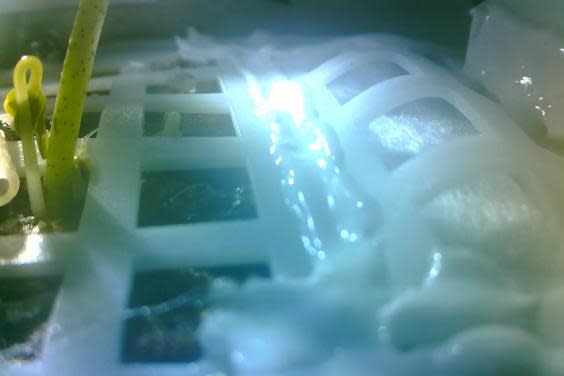China grows first ever plant on Moon
China has successfully germinated a seed taken to the Moon – the first time any biological matter has grown in space, as part of an unmanned lunar mission which aims to help inform long-term space exploration.
The aim is not just to successfully grow plants, but to also make them flower, which if all goes to plan will happen towards the end of a 100-day experimental period.
The Chinese Moon lander is carrying a sealed container with soil, cotton seeds, rock cress rapeseed and potato seeds, yeast and fruit fly eggs.
The idea is the contents of the pod will create a self-sustaining environment for life off our planet.
This would mark a major step in how lengthier space voyages could provide food sources for astronauts without them having to return to Earth for supplies.
China’s National Space Administration released a picture of the sprouting cotton seeds on Tuesday.
Professor Liu Hanlong of Chongqing University, who led the research, said the rapeseed and potato seeds had also germinated, but the cotton seeds were first to sprout, according to the South China Morning Post.
“We have given consideration to future survival in space. Learning about these plants’ growth in a low-gravity environment would allow us to lay the foundation for our future establishment of space base,” Mr Liu said.

The Chang’e 4 lunar probe is also the first to land on the dark side of the moon which faces away from Earth.
Plants have previously been grown on the International Space Station, but never on the Moon.
The South China Morning Post said the aluminium container, known as a “moon surface micro-ecological circle”, weighs just 3kg, but cost more than 10 million yuan (£1.15m).
The container is designed to maintain a temperature of between 1 and 30 degrees, allow in natural light and feed the plants with water and a nutrient solution.
The six components within were selected to behave as “producers, consumers and decomposers” with the plants producing oxygen and food by photosynthesis and also providing a food source to sustain the fruit flies. The yeast is designed to act as a decomposition agent to deal with the flies’ and plant waste.
The Moon is not a hospitable environment for life, with conditions which oscillate between -173C and over 100C.
Support free-thinking journalism and subscribe to Independent Minds
Professor Xie Gengxin, who also worked on the experiment, said if successful, the project would signal that China was catching up in space exploration, state-run Beijing Youth Daily reported.

 Yahoo News
Yahoo News 